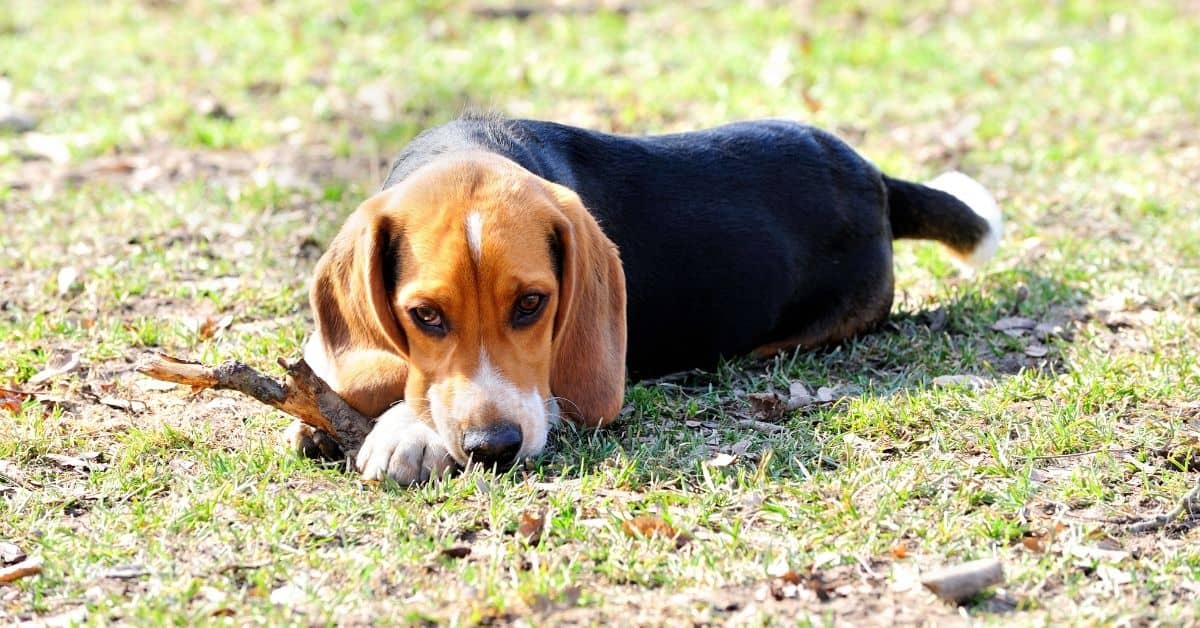Do you ask yourself, “Why does my dog chew his paws?”.
You’re in the right place!
Most dogs may lick and chew on their feet to clean them, and other dogs may do this during their regular bedtime or play sessions.
A change in your dog’s paw chewing behavior, especially if it’s longer or more aggressive than usual, may indicate health issues.
A worrying behavior is if your dog is constantly chewing or biting his paws.
Your dog should never come out of a grooming session with raw or red paws, and sessions should take no more than five to ten minutes.
It’s not normal for your dog to lie awake at night worrying about their paws or to stop during walks or playtime to nibble or chew on them.
Whenever you see any of these signs, it’s time to check your dog’s paws and maybe even make an appointment with the vet.
Why Does My Dog Chew His Paws? – The Reasons
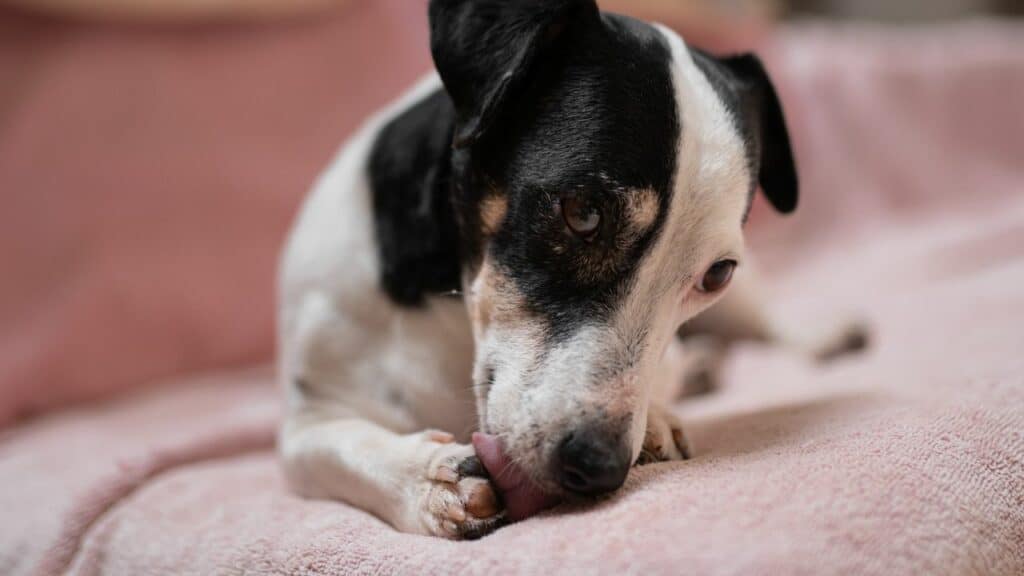
It can be unpleasant if your dog suddenly starts chewing on his paws continuously.
Your dog is chewing on his paws for various reasons, and the only way to help him is to figure out what those reasons are.
The most common causes of your dog chewing his paws are as follows:
Injuries
Dogs frequently lick their wounds, so you should immediately check their paws for damages when your dog starts chewing on his feet.
Always look for injuries such as cuts, punctures, splinters, or discomfort.
Also, take note if your pet has trouble putting weight on the injured paw.
Related: Dog Wound Care: A Complete Guide
Allergies
Dogs frequently bite their paws when they’re feeling itchy.
Visualize this as the dog equivalent of scratching an itch (although dogs will sometimes do that with their paws too).
Itchiness and irritation, which can lead to the impulse to bite, are common symptoms of allergies.
Dry Skin
When your skin is dry, you get itchy and irritated; the same is true for your dog.
Whether or not your dog’s skin is dry should be one of your first concerns when the weather is cold and dry.
Use a fur moisturizer on him, and the itching and irritation should go away.
Parasites
If your dog has parasites, especially flea bites, it may experience itching and other symptoms.
We’ve established that when the pup feels itchy, he’ll lick or chew at the region.
if you suspect that your dog has fleas, check it as soon as possible.
Pain
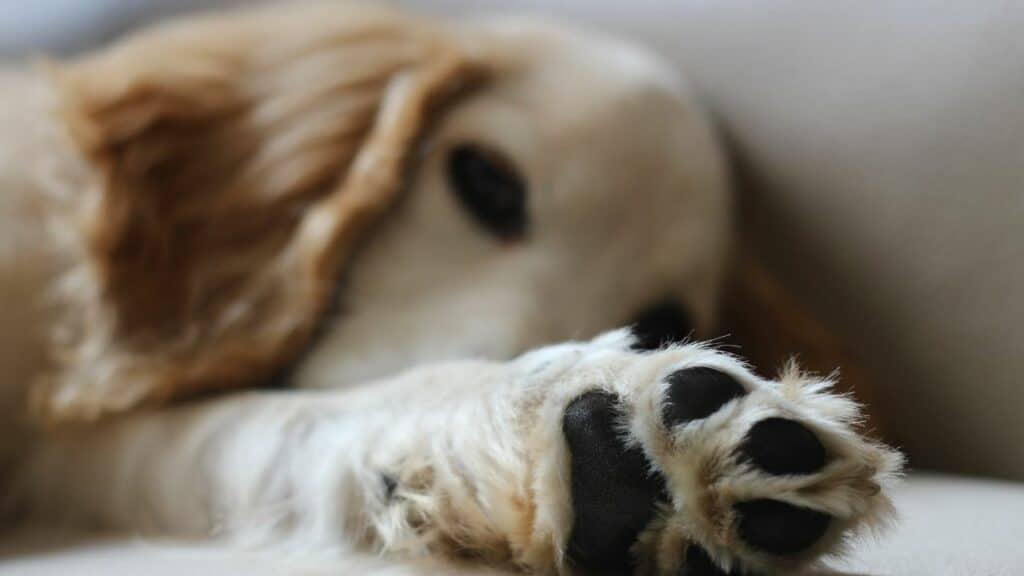
If your puppy shows signs of pain, such as chewing at limbs, it’s essential to check them out immediately.
Dogs will chew on their paws in response to pain, not only paw pain.
That is still the first place to look for a painful injury or illness on his body.
Paw Pad Disorders
Our dogs may constantly chew or lick on their paws because they are painful when they have cracked, dry, or damaged paws.
Painful lesions on the paw pads can be a symptom of some autoimmune diseases, such as pemphigus.
Dogs are likely to bite all four paws in these situations.
Other problems, such as the common paw pad corns in Greyhounds, cause our dogs to bite or chew on just one paw repeatedly.
The underlying cause of these conditions will determine the course of treatment.
A biopsy may be required if your veterinarian worries about an autoimmune disorder.
Surgery is frequently required to remove corns.
Paw balm purchased over the counter is a successful treatment for dry or cracked paws.
Infections
The moisture on a puppy’s paws can sometimes cause bacterial or yeast infections.
Most of the time, canine companions will have redness around their paws and sometimes on their paw pads due to bacterial infections (yeast infections).
Oral antibiotics for dogs are usually given to treat these yeast and bacterial infections.
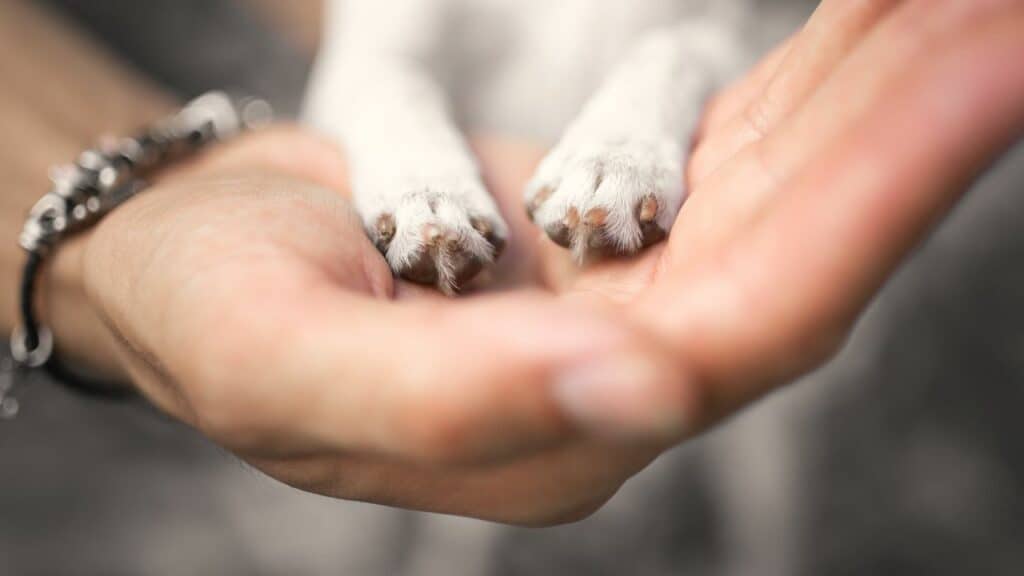
Burnt Paw Pads In Summer
It would be best if you were mindful of the hot pavement (concrete’s temperature) when walking your dog in the summer.
Your dog’s paw pads could get burned if it gets too hot.
Dog chewing paws to ease the discomfort from hot weather; use dog booties to stop chewing.
Winter Salt Irritation
In colder climates, dogs may become irritated from walking on salty, gritty roads.
It would help if you considered getting dog booties for your pet to protect his paws from this irritation, as your dog may start chewing on itchy paws to relieve the pain.
Claw Problems
Checking his claws is a good start when figuring out why dogs chew on their paws.
He may be trying to mend a broken or loose claw by paw chewing.
By clipping the claw, you can solve this problem for them.
Take your dog to the vet if you don’t feel confident handling the situation yourself.
It’s worth noting that ingrown claws can have the same effect.
If your pet has an ingrown claw, you should take them to the vet for treatment.
Yeast infection is another issue that the vet will look into it.
Anxiety
Know the canine stress and anxiety symptoms, including self-grooming, to help your dog through tough times.
Please keep track of the times of day and the circumstances under which your dog is chewing his paws; this may help determine what sets him off.
Boredom
Some dogs chew their paws out of boredom; this is normal behavior by a furry friend.
Giving your dog some puzzle toys or long-lasting chews may help to relieve your pet’s boredom if you notice that the dog starts chewing after spending some time alone.
Additionally, ensure your pet gets plenty of playtime and exercise throughout the day.
Self-Injury
Unfortunately, when dogs sustain a small wound, some can become caught in a vicious cycle (such as a splinter in their paws).
Minor injury results in occasional paw chewing, aggravating the underlying problem further.
This temporary irritation causes them to chew their paws more frequently, which, as you might have guessed, worsens the irritation.
How To Stop Dogs From Chewing Paws And Nails
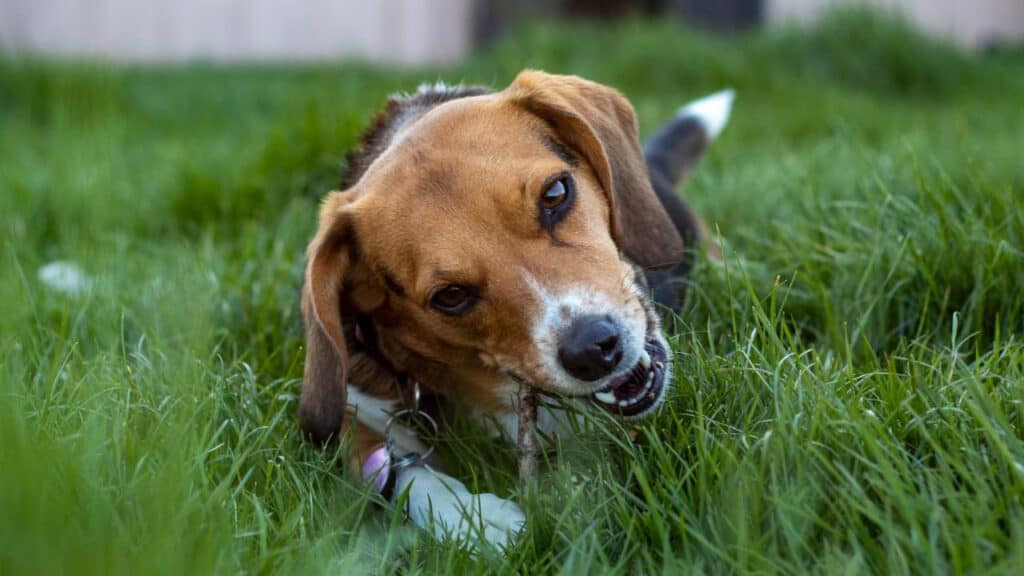
The following are a few specific cures and ways to stop dogs from chewing their paws:
Purchase Booties For Your Dog
Pooch booties are the best option if the chewing is most likely brought on by salt burns in the winter or burns from hot pavement in the summer.
Many excellent choices are available to purchase these booties to stop dogs from chewing their paws.
Keep Your Dog’s Dewormer Up To Date
The easiest way to stop your dog from paw chewing because of insects and other parasites is to keep up with their flea and dewormer treatments.
Give Him Something To Chew On
Being pet parents, you can try redirecting your dog if you’re unsure why the dog is chewing his paw or if it’s become a habit.
The most effective way to achieve this is by providing alternatives to chewing, such as chew toys.
Purchase Toys To Relieve Anxiety And Boredom
Consider purchasing toys for your dog to keep him occupied in the event of anxiety or boredom.
To help him burn off excess energy, you might also try taking him for extended walks or runs.
It would be best if you made anxiety to determine what causes his stress and then try to avoid those triggers.
Prevent Itching By Caring For Your Dog’s Coat
Focus on better coat care if you experience itching from dry skin.
Consider adding a conditioner, switching to a moisturizing oatmeal shampoo when bathing your dog, or purchasing a balm to relieve dog paws.
Change To Food For Allergies
Start by switching your dog to food made for puppies to treat food allergies if you suspect the dog’s allergies cause the issue.
You can work with your vet to identify the ingredient he is most likely allergic to.
When You Need To Go To The Vet
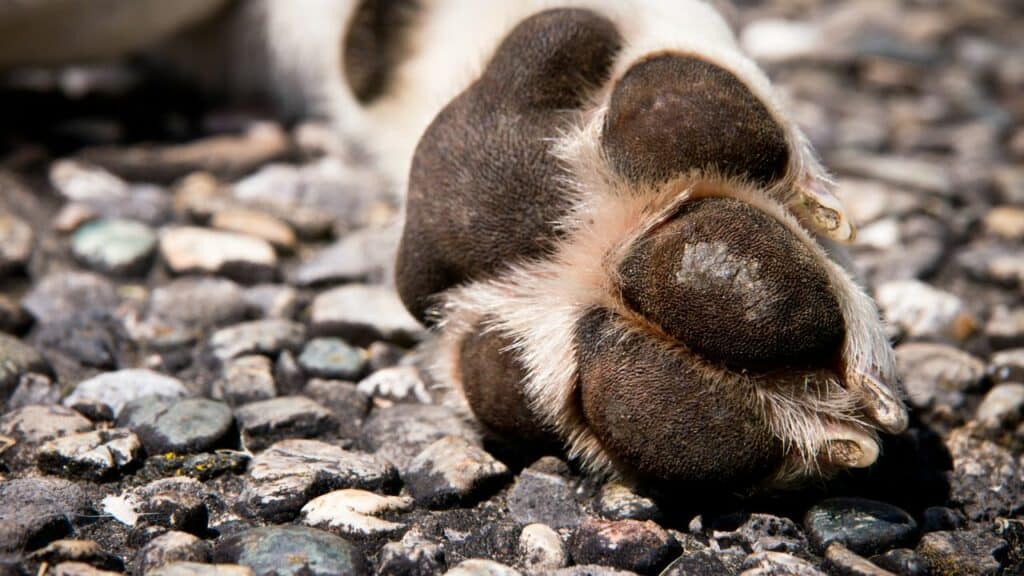
Most of the time, it’s acceptable to keep an eye on your dog to determine whether dog chewing paws is a severe problem, if it’s just out of boredom, or if something more detailed, like a small splinter.
However, if the dog chewing paws is a recent (and persistent) problem and you notice that the foot is red or inflamed, those are two indicative signs that it’s time to take your furry friend to the vet.
There might be a dangerous underlying cause in either scenario for your dog.
For instance, if your dog has a food allergy, it is crucial to treat them immediately because food allergy can be very harmful if it is regularly exposed to environmental allergens.
Similar to how bacterial infection, painful wounds, and parasites can all worsen if not carefully checked by a qualified vet.
Before You Go…
Now you know the answer to the question, “Why does my dog chew his paws?”.
If you want to learn more, read the following article too!
Or watch this video:

